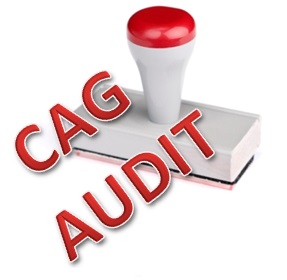 In a verdict yesterday, the Delhi High Court allowed the Comptroller and Auditor General (CAG) of India to audit the accounts of private telecom companies under the Telecom Regulatory Authority of India (TRAI) Act.
In a verdict yesterday, the Delhi High Court allowed the Comptroller and Auditor General (CAG) of India to audit the accounts of private telecom companies under the Telecom Regulatory Authority of India (TRAI) Act.
This his kind of ruling was unthinkable even a few years back as CAG was and is still largely seen as an auditor of companies owned by the government.
As natural resources such as spectrum, gas/oil fields, coal, etc cannot be easily priced, the government has a big stake in these sectors and many of these companies that are involved in the production sharing of natural resources or profit sharing from natural resources enter into a public-private partnership (PPP) with the Government of India, so it appears logical that industries and sectors that deal with precious natural resources come under the ambit of CAG.
CAG doing audit of such private companies will have the several ramifications on the overall dynamics of the industry.
- It will expand the role of the institution and may influence the auditing methods followed in companies. CAG will aim to check if there are any efforts to pad up costs or any instances of loss of revenue to the government where the private players have enjoyed profits that ought to have gone to the government. Their audit report will be as valuable for the investors as the external auditor's report. There might also be some conflict with the Income Tax Department if CAG checks the accounts and find cases of discrepancies in the tax payments.
- Though the audit is to pertain to the audit of receipts, but to do a fair audit CAG may demand access to information such as top-level deliberations and decisions or the minutes books of the board of directors. While the CAG may see this as governance, companies may construe it as excess of interference. CAG may form an opinion depending on the information that it comes across during audit and ask companies to provide suitable justification for any expenses that they might have incurred but not shown in the books. According to the Principle of Materiality companies only need to include significant or material expenses in the accounting statements. Non material expenses that are either small or are not significant are not included in the books of accounts.Any unresolved difference of opinion between CAG and companies on materiality of accounts could negatively impact the companies. Theoretically a company should not run into difficulty if a reasonable return is guaranteed vide the framework. But if any inefficiencies are highlighted , then it could result in fine being levied, and which may impact the bottom line of the companies and may result in deterioration in the quality of services being provided as the company runs into difficulties.
- Many decisions could come under the scanner including those involving procuring spectrum at low prices and selling them to foreign players at windfall gains , thus shifting the gains from government to private players and other revenue sharing details. It could also lead to CAG fixing accountability by inferring omission and commission if they do not get information to their satisfaction.
- In any public company it is the responsibility of the Board of Directors to select and approve the auditors to ensure fair audit and share the findings of the audit with the stock holders and financiers. With CAG conducting a separate audit, there is a possibility of some change in the power equation of the Board.
This ruling also shows that changes do start taking place albeit gradually when there is an erosion of confidence in the system or in certain institutions.
What do you think? Do share your views.
What do you think? Do share your views.
No comments:
Post a Comment